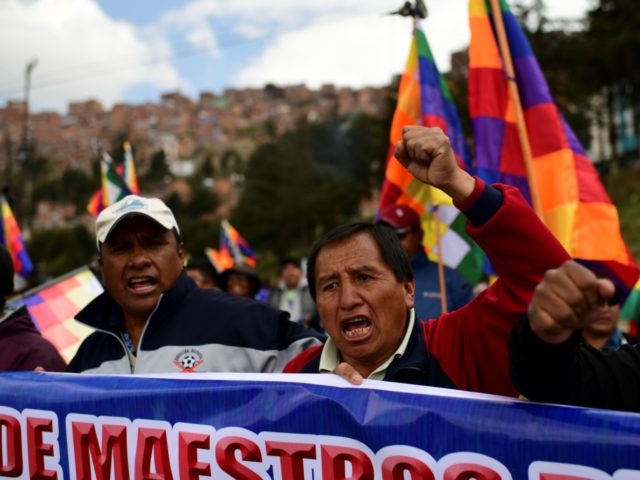Thousands of residents of socialist stronghold El Alto, Bolivia, marched into the nation’s economic hub and executive government seat, La Paz, chanting “here we go, civil war” on Tuesday.
The Bolivian newspaper El Deber reported that locals in La Paz expressed concerns about the “hordes” of outsiders flooding the city and demanding war following the resignation of socialist President Evo Morales. The members of the thousands-strong crowd are supporters of Morales’ Movement Towards Socialism (MAS) party and leaders of farmers’ unions who have accepted Morales’ claim that his departure was a “coup.”
Morales stepped down from the presidency on Sunday after 13 years in power. He ran for an unconstitutional fourth term in office in the October 20 election after forcing the nation’s top court to find that all individuals had a “human right” to be on any ballot, making the Bolivian constitution’s term limits a human rights violation. Morales’ resignation followed the revelation by international observers from the Organization of American States (OAS) of significant evidence of fraud in the October 20 election, preventing a constitutional run-off election after a mystery server flooded the vote tallies with thousands of votes for Morales.
Morales fled to Mexico on Monday after saying in his resignation speech he would return to his native Cochabamba to advocate for the rights of coca growers. The lucrative coca plant is used to make cocaine.
At least seven people have died in protests since the October 20 election, including a police special operations officer killed after dodging a bag full of dynamite this week in La Paz.
Morales’ resignation and the ascent Tuesday of former Senate deputy president Jeanine Áñez to the presidency – the highest-ranked person in the chain of command to not resign and flee the country – triggered a new wave of violence nationwide, most of it from MAS supporters. Many of the protesters storming La Paz from El Alto on Tuesday said they were not only demanding Morales’ return to office, however, but condemning the widespread images of Morales opponents burning the Wiphala flag.
The Wiphala represents the 36 indigenous nations that make up Bolivia and is a legal flag of the nation, worn by police and military officers on their sleeve. Morales was Bolivia’s first indigenous president, so some of his opponents burned the flag to protest him.
The nation’s prominent opposition leaders have condemned the desecration of the Wiphala and police officers in La Paz held a ceremonial flag-raising as a form of apology to indigenous people, offering statements in Quechua and Aymara, two of the nation’s indigenous languages.
According to El Deber, the thousands entering La Paz on Tuesday did not appear organized into one solid protest and arrived in at least five different groups that had independently organized marches into the city. On their seven-mile walk from El Alto, the masses burned down and destroyed “seven major police stations,” the newspaper reported, highlighting that reporters personally visited six of them and verified their destruction.
“Dozens of burned computers, swivel chairs, microwave ovens, utensils, were dispersed throughout the stations,” the newspaper noted. The destruction is likely to affect many criminal cases, as the assailants burned filing cabinets and destroyed criminal records. They also reportedly burned police cars and motorcycles. Stations with any significant food or goods also faced looting.
The groups entering the city chanted “ahora sí, guerra civil,” which roughly translates to “here we go, civil war”:
The marches attempted to prevent the appointment of anyone to the position of president of Bolivia. As many as 50 members of MAS resigned from high-ranking positions, most fleeing to Mexico, making it impossible for the government to function. On Tuesday, the nation’s Congress, with the blessing of the highest constitutional court, granted the interim presidency to Áñez, a staunch conservative. MAS senators attempted to prevent the appointment by boycotting the Senate session to fill the presidential vacancy, preventing a quorum, but the constitutional court found the appointment valid due to the extraordinary circumstances surrounding the vacancy.
On Wednesday morning, the Syndicalist Confederation of Intercultural Communities of Bolivia, a rural indigenous coalition, announced a general strike demanding the return of Morales.
In a video posted by the Argentine radio station La 750 Salta, a confederation leader announced that the blockade was necessary “for the dignity and sovereignty of the indigenous, peasant, original peoples.
“The most hurt we have felt has been when they burned and trampled our Wiphala, which represents the 36 nationalities of our Plurinational State of Bolivia [the official name of the country.”
“We want the heads of Mesa and Camacho, out with the racists!” the man adds, referring to Morales’ leftist opponent in the October 20 election, Carlos Mesa, and Luis Fernando Camacho, a conservative protest leader.
Leftist strike leaders in the countryside similarly said they were protesting against Áñez to defend the Wiphala.
“Respect us country people because we work to bring food to the city,” a man told local media. “Last night, an opposition senator appointed herself president. For us, she is not her president because she was not constitutionally, legally named … we demand her resignation and the return of our Mr. Evo Morales.”
The Bolivian national police organized another ceremony to honor to Wiphala on Wednesday. Áñez appealed to conservative indigenous people to support her leadership until she could organize a new election in her first remarks as president Tuesday.
Follow Frances Martel on Facebook and Twitter.

COMMENTS
Please let us know if you're having issues with commenting.